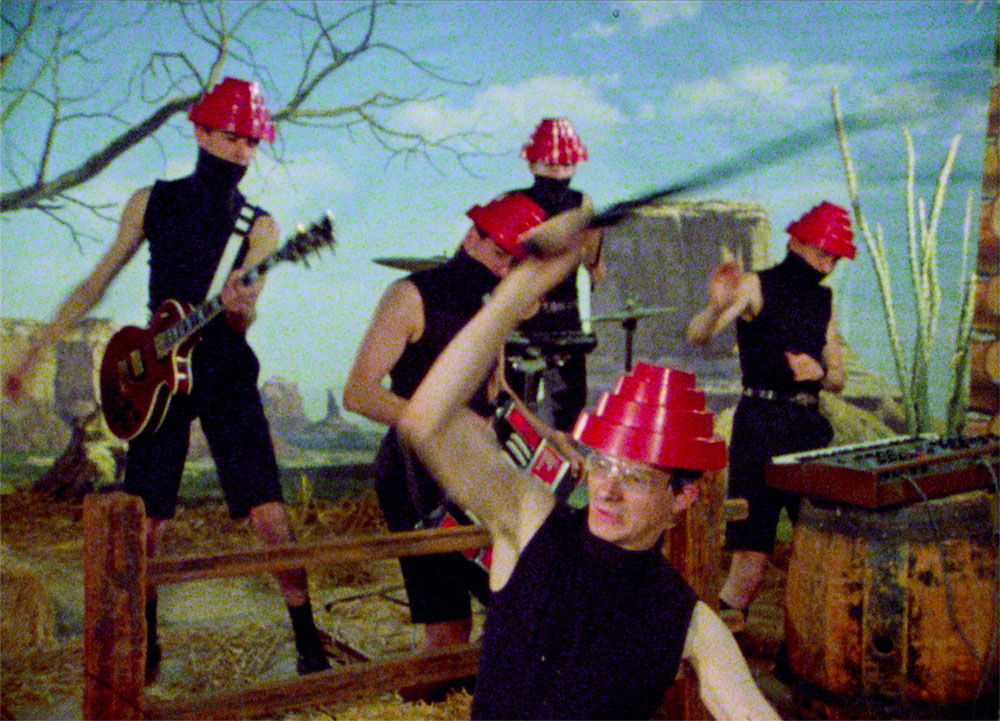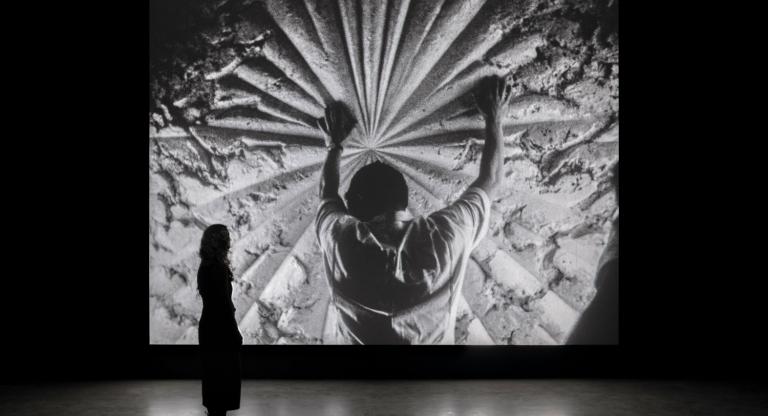Last year marked the 50th anniversary of DEVO’s formation as an art-punk band in Akron, Ohio. In a short promo from their 1981 tour, General Boy (a fictional military general played by the father of band members Mark, Jim, and Bob Motherbaugh) declares, “It’s time to look for new traditions, it’s time for DEVO.” The maxim is central to the band’s philosophy of de-evolution, a shared belief that society appears to be slipping backward. Formed in the wake of the Kent State University Shooting, which band members Gerald Casale and Mark Mothersbaugh experienced firsthand, the group’s musical blend of feverish proto-punk grooves and sharp social critique was a reaction against the United States’ tilt to the political right during the postwar era. “I saw the depths of the horrors and lies and the evil,” said Casale regarding the shooting. “I stopped being a hippie and started to develop the idea of devolution.”
DEVO’s views on the retrograde state of society is clear in songs like “Jocko Homo,” in which Mark Mothersbaugh sings, “Monkey men all / in business suits. / Teachers and critics / all dance the poot.” And their stance against the rampant consumerism they witnessed in the United States throughout the Cold War is self-evident in their ironically titled album Freedom Of Choice (1980). The band’s use of drums, which at times evokes the sound of a military march, alongside their pointed lyricism embody their fears about the country’s regressive trajectory giving way to a fascist state. DEVO’s music articulates their misgivings about where the United States’ capitalist project is headed, but it does not describe an alternative destination. Theirs is a sound of protest, an invigorating rage channeled into infectious chants that are more expressive than didactic. But the lack of clear guidance in DEVO’s music is no miscalculation; instead, it is the band’s visual aesthetic—as seen in fashion, film, music videos—which alludes to the alternative traditions they seek. Drawing heavily from Russian Constructivism and its industrially inspired use of geometric figuring and color blocks, DEVO traces its way into a lost future that was dreamt up by workers rebelling against their status quo. As Peter Conheim—the film archivist behind the recent restoration of DEVO’s film catalog—writes, “DEVO emerged from its spud cocoon as a hydra-headed music, art, and film collective.” Their project is entirely holistic, using disparate mediums to express singular concerns about the world and dreams for a new society.
The theory of de-evolution, its logic of epochal reversal, presents DEVO as time travelers. As society spins backward, so do they. And as far as their journey goes, the moments they isolate on film provide clues about their allegiance with previous avant-garde movements that had tried to escape their own society’s traditions in favor of new realities. The title of their first film, In the Beginning Was the End: The Truth About De-Evolution (1976), collapses time in on itself, and although it could be understood as a summary of defeat—we were doomed from the start—the film’s contents say otherwise. The band gives a stiff performance of “Secret Agent Man” dressed up as factory workers, followed by “Jocko Homo” delivered by Mark Mothersbaugh as a lecturing scientist. These sequences are juxtaposed with appearances by band members as apes and writhing worms, drawing a contrast between the soul-deadening nature of industrial-scientific labors and the feeling of freedom that proto-human role-play can inspire. By the final scene, in which the lecturing scientist begins imitating the wild movements of the worms and his students start pounding their desks in a mad frenzy as though they were a troupe of angry apes, it becomes clear that the theory of de-evolution represents more than a retreat into conservatism. On the one hand, de-evolution suggests that society will fall back on archaic customs as it slips into the past, but on the other, it posits a great freedom in societal rewind. DEVO’s anarchic turn in The Truth About De-Evolution presents a vision of humanity that has rid itself of soul-crushing customs and is ready to set off on a new path. Theirs is an infinite regression, an eternal reconfiguration from man to ape to protozoan; a bold retreat, an escape from the now, a refusal to move forward into the future when we ought to go sideways and elsewhere.
In an interview about the making of the collage artist Bruce Conner’s music video for their early single “Mongoloid,” Mark Mothersbaugh notes that DEVO owes a lot to Russian Constructivists and Dadaists, aesthetically disparate movements that both threw their support behind communism in the wake of World War I, while fascism was on the rise. The video, for which Conner edited together 1950s educational films and advertisements, comments on the inanity of workplace culture and hearkens back to the Dadaist practice of collage-making, which the former MoMA curator William Rubin called a method of attacking “the bourgeoisie with distortions of its own communications imagery.”
DEVO’s routine appearances as industrial workers fitted with their signature ziggurat-like “energy-dome” hats mirror the geometric rendering of industrial workers extolled in Constructivist paintings. Scenes from the popular American imaginary—game shows, rodeos, roller derbies, retail stores—throughout their music videos present an ideological juxtaposition. On one side there’s the idealized Russian worker standing in for communist values and on the other the unrestrained consumer representing the most farcical vision of capitalist indoctrination. In their music video for “Girl U Want,” DEVO performs on a stage resembling that of a late-night show before an audience of well-dressed men and women, which cheers in response to a series of infomercials transmitted by General Boy. It appears the band’s message of love is entirely lost on the audience, which lusts for consumer goods above all else.
Given the cheeky nature of their project, it might just be that DEVO’s critical imaging of the American public and their visual allegiance with the radical politics of yesteryears’ avant-garde movements represents a form of tough love, rather than a total break-up with their present. To quote one of the band’s later tracks: “Love without anger / is not love at all.” Theirs is not a project of condemnation, rather one of reorientation. Their music and films provide an opportunity to assess the current moment—in all its idiocy—and look to history’s stalled revolutions for a better way of being. In de-evolution lies a countermove against linearity and its attendant politics, which evidence shows is set to result in the destruction of planet Earth.
“De-Evolution Is Real: The Restored Films of DEVO” screens tonight, January 27, at the Museum of Modern Art as part of “To Save and Project: The 20th Annual MoMA International Festival of Film Preservation.” DEVO founders Gerald Casale and Mark Mothersbaugh and restoration head Peter Conheim will be in attendance.




